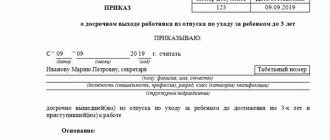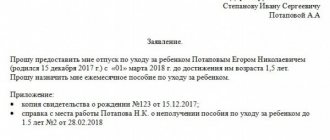16.06.2019
0
238
7 min.
Russian legislation provides for a range of measures to support young parents. Some of them are recorded in the Labor Code. Article 256 of the Labor Code of the Russian Federation outlines the rules for granting parental leave, as well as aspects related to the payment of benefits.
Is maternity leave considered maternity leave?
Parental leave must be distinguished from maternity leave, which is leave granted in connection with pregnancy and childbirth (Article 255 of the Labor Code of the Russian Federation) and issued with sick leave. Its name goes back to the decree “On Maternity Benefits” issued in 1917 in Russia.
Maternity leave is mandatory and is given only to the mother. Leave to care for a child up to 1.5 years old (Article 256 of the Labor Code of the Russian Federation) is taken at will, can be used in parts, be provided not only to the mother, but also to other persons actually caring for the child, and allows for the possibility of continuing (resuming) work during it on a part-time basis.
Can going on maternity leave without authorization lead to dismissal?
Obtaining parental leave depends only on the desire of the child’s mother to take it, expressed in the application. The employer does not have the opportunity not to provide such leave. So, having written the necessary application, a woman can go on vacation without waiting for the employer’s decision. Even if the latter is not satisfied with this situation, he will not be able to fire the employee for absenteeism (decision of the Moscow City Court dated November 12, 2012 in case No. 11-6805).
For more information on how to fill out an application for parental leave, read the article “Application for parental leave - form and sample” .
If the corresponding leave is taken not by the mother, but by the father or another person, simultaneously with the application, the employer must submit a document confirming that the child’s mother (or both parents, if it is not the parent who takes the leave) is either working (and such leave has not been issued at work), or is unemployed. A person who has taken out such leave is fully covered by all the guarantees provided by Article 256 of the Labor Code of the Russian Federation:
- maintaining his job;
- the ability to use vacation in parts;
- receiving care benefits;
- the opportunity to resume work on a part-time basis while maintaining benefits;
Read about how the working day must be reduced in order for benefits to be maintained here.
- accounting for vacation time in the length of service.
Documents for obtaining benefits
All documentation necessary for obtaining child benefits may be submitted both in paper form and on electronic media.
This is provided for by Russian regulations. In order for the mother to have the opportunity to receive funds in the amount of 40% of the average salary, she should prepare :
- Application addressed to the head of the enterprise. It is compiled in free form, but most often the organization has a special template.
- Child's birth certificate and a copy of it. If there are several children, then you need to submit documents for each of them.
- A certificate from the second parent’s place of work indicating that he does not receive the specified benefit.
If an employee has changed several companies over the past two years, then she needs to obtain a salary certificate from each company. If she carries out part-time work in different organizations, then the woman should additionally request a certificate stating that the benefit was not assigned.
Although the material support paid by the Social Insurance Fund is small, it is very important for many Russian families. This state benefit, received by the mother of a newborn through the employer, not only financially supports the family, but also provides the woman with the opportunity to prepare for returning to work. After all, leave to care for a child according to the Labor Code of the Russian Federation ends the next day after the minor turns three years old, which means after that his mother is obliged to either resign from the organization or resume her production activities.
What benefits are paid during parental leave in 2020–2021?
For a person who has taken leave to care for a child, Article 256 of the Labor Code of the Russian Federation secures the right to receive benefits at work related to this leave. Including benefits are paid in case of part-time work. Moreover, it does not matter where the employee continues to work under such conditions: where he is paid benefits, or in another place.
The types and amounts of benefits provided for in Article 256 of the Labor Code of the Russian Federation (with comments for 2020–2021) are as follows:
- Monthly allowance for child care up to 1.5 years (Article 14 of the Law “On State Benefits for Citizens with Children” dated May 19, 1995 No. 81-FZ). It is estimated as 40% of the employee’s average earnings determined for the 2 years preceding the vacation. However, there is an upper limit to its size, defined as the sum of the maximum values from which contributions to the Social Insurance Fund were paid in each accounting year, divided by 730 (clause 3.3 of Article 14 of the Law “On Compulsory Social Insurance in Case of Temporary Disability and in Connection with Maternity " dated December 29, 2006 No. 255-FZ). The minimum benefit amount, subject to annual indexation, is also determined by law. For 2021, the benefit is set in the following amounts:
- minimum when caring for the first child - 6,752.00 rubles;
- for the second - 6,752.00 rubles.
These indicators are valid from 06/01/2020 (Resolution of the Government of the Russian Federation dated 01/29/2020 No. 614).
IMPORTANT! You need to keep in mind that from June 1, 2020, the minimum amount of child care benefits for children up to 1.5 years old does not depend on the child’s age. See here for details.
In case of interruption of vacation and return to work full-time, payment of benefits is terminated (letter of the Ministry of Labor of the Russian Federation dated May 16, 2013 No. 13-7/3030623-2831).
- Monthly compensation in the amount of 50 rubles. (Decree of the President of the Russian Federation dated May 30, 1994 No. 1110), paid until the child reaches 3 years of age and calculated taking into account the regional coefficient (Decree of the Government of the Russian Federation dated November 3, 1994 No. 1206).
- Additional payments established by regional laws, made at least once a quarter (Article 16 of Law No. 81-FZ).
Thus, parental leave provided for in Art. 256 of the Labor Code of the Russian Federation, taking into account comments regarding the timing of payment of benefits during it, is divided into 2 parts:
- up to 1.5 years, for which payment of all types of established benefits is mandatory, including monthly care allowance;
- from 1.5 to 3 years, during which care allowance is not paid, but compensation established by Decree No. 1110 continues to be paid, as well as additional payments established in the region (if the corresponding regional legislative act is in force during the specified period).
An exception is the care allowance paid to citizens affected by radiation during the Chernobyl disaster. For them, it is set at double the amount and is paid until the child turns 3 years old (Decree of the Government of the Russian Federation dated July 16, 2005 No. 439, order of the Ministry of Health and Social Development of the Russian Federation dated December 1, 2008 No. 692n).
For more information on how child benefits are assigned, read the article “Assignment and payment of child care benefits up to 1.5 years old .
How is vacation paid?
After the rest period according to BiR ends, the time for caring for the baby begins. For the first year and a half, a young mother receives an allowance amounting to 40 percent of her average salary. The average salary in this case is calculated for the 24 months preceding maternity leave. The child’s father can also apply for this benefit (for example, if his salary was higher or the mother cannot look after the child herself). But only one person from a family is entitled to social benefits, and he does not have to work full time.
For the current year, the minimum amount of payments to help young parents is 3065 rubles 69 kopecks per child and 6131 rubles 37 kopecks. The maximum you can receive is 12,262 rubles 74 kopecks, provided that the organization has been liquidated. In this case, an additional monetary guarantee in the amount of one and a half thousand is provided for Moscow mothers. Ordinary working people, according to the maximum, can receive no more than 23,089 rubles 04 kopecks monthly. Minimum amounts are subject to change using the district coefficient. This recalculation rule does not apply to maximum amounts.
The amount is the same throughout the Russian Federation. Please note that maximum and minimum payment amounts may vary depending on your region of residence. After one and a half to three years, a woman is entitled to an allowance of 50 rubles. For families considered to have many children, additional payments are provided (for the third and subsequent children).
The amount of this benefit will also vary depending on the region of residence and is assigned from the end of the B&R leave until the age of three. The smallest additional payment is a little more than 6,000 rubles, the largest payment is a little more than 16,000 rubles. To calculate the average salary, 24 calendar months are taken. Moreover, this period can be summed up, even if the expectant mother worked in different organizations. You will only need to provide a certificate of earnings from your previous place of employment confirming your income.
You can receive children's benefits only if you have submitted an application no later than when the baby reaches the age of 24 months (1.5 years plus another 6 months), otherwise these social benefits will be lost forever.
With what comments and reservations is Art. 256 of the Labor Code of the Russian Federation (Part 3) in 2020–2021?
Art. 256 of the Labor Code of the Russian Federation allows a person who has taken out parental leave to work part-time during the leave if there is a desire. The employer must provide such an opportunity (letter of Rostrud dated September 12, 2013 No. 697-6-1) and cannot force the employee to refuse this job.
At the same time, there are often situations when an employee cannot cope with the amount of work, makes mistakes or violates the work schedule established for him (is late or absent), that is, commits disciplinary offenses. Can disciplinary action be taken against him?
The Labor Code of the Russian Federation does not contain a ban on this. However, there are 2 opposing points of view regarding the use of dismissal as a disciplinary measure:
- it is acceptable (letter of the Ministry of Labor of the Russian Federation dated September 10, 2013 No. 14-2/3045-623-4334);
- it is illegal, because work is carried out during vacation, and it is impossible to dismiss an employee during this period (Article 81 of the Labor Code of the Russian Federation) (decision of the Primorsky Regional Court dated 05/03/2012 in case No. 33-4035).
Thus, disciplinary action in the form of dismissal during parental leave will most likely be considered illegal. Safe disciplinary measures against such employees should be considered:
- comment;
- rebuke.
It is also possible to influence labor results through deduction of bonuses in connection with the employee’s disciplinary offenses, if it is provided for by the employer’s bonus regulations.
For more information about the cases in which deduction of bonuses is associated with a disciplinary offense, read the material “What are the grounds in the Labor Code of the Russian Federation for depriving an employee of a bonus?” .
In what cases can an employee be fired during parental leave?
Art. 256 of the Labor Code of the Russian Federation declares the obligation to maintain a workplace for the employee during parental leave. That is, it is impossible to fire him in a normal standard situation on the initiative of the employer.
However, there are situations when dismissal due to the employer’s initiative does occur during such leave or before the child reaches the age of 3 years. These include (Article 261 of the Labor Code of the Russian Federation):
- liquidation (termination of activities) of the employer;
- termination of an employment contract concluded for a certain period;
- dismissal of an employee who has left parental leave early due to gross violations of labor discipline (for example, absenteeism, theft, disclosure of secrets, immoral acts).
However, there are no restrictions on the dismissal of an employee during this period on his own initiative. It happens as usual.
For more information about disciplinary offenses considered gross, read the article “Labor discipline and responsibility for its violation .
Women who were fired or quit during the period when they have the right to receive child care benefits for up to 1.5 years may then be:
- Employed until the end of the benefit period. Then the new employer will continue to pay him according to his own calculations.
- Not employed. Then the benefit can be received from the social security authorities. But you will have to make a choice between 2 benefits: unemployment and care (clause 40 of the order of the Ministry of Health and Social Development of Russia dated December 23, 2009 No. 1012n).
In some situations, an employee may need to resign in order to care for a child under 14 years of age. ConsultantPlus experts explained in detail how to formalize dismissal for caring for a child under 14 years of age. Get free demo access to K+ and go to the Ready Solution to find out all the details of this procedure.
Duration of maternity leave
Although maternity leave officially lasts three years from the date of birth of the child, it is usually divided into two periods. The first of them lasts until the child reaches the age of one and a half years, and during this time the mother receives a special child benefit every month.
The second period lasts until the child’s third birthday, and the monthly payment is reduced to 50 rubles. An employee submits an application for release from work due to maternity leave only once, and she is given the right, at her own request, to return to work duties after the newborn turns 1.5 years old.
Exemption from work for up to one and a half years
The duration of a woman's rest after childbirth depends on the course of pregnancy.
So, in Art. 255 the following vacation options :
- during a normal pregnancy, the employee is entitled to 70 days of rest;
- in case of difficult childbirth, the leave period is 86 days;
- When two or more children are born, the mother's rest period is 110 days.
During this time, the employee retains her full average salary, calculated based on the data of the last two years.
Such terms are provided to the adoptive parents of a child under three months of age. All information about childbirth necessary to apply for leave and receive payments must be confirmed by documents from a medical institution.
Child care up to three years of age
After the child turns 1.5 years old, his mother can only count on 50 rubles paid by the employer.
The peculiarity of this benefit is that it has nothing to do with the Social Insurance Fund. The employer makes this payment directly from the organization’s funds. And if a woman worked part-time at several enterprises before her maternity leave, then all employers are required to transfer the specified amount to their employee. In addition, if an application for payment is submitted later than the deadline, the money is transferred in full for the entire past period. Termination of such payment is possible for one of the following reasons :
- The woman submits a resignation letter of her own free will. The employer does not have the right to end the relationship with an employee who is on maternity leave on his own initiative.
- The organization was officially liquidated. The mother of a young child should register with the local employment service. This will allow her to receive unemployment benefits.
- The woman is deprived of the rights and responsibilities of a parent, and her child is transferred to state support.
The employee has the right to end maternity leave at any time convenient for her and begin work in her previous position.
The legislation imposes on the head of an enterprise the obligation to maintain a woman’s job throughout the entire maternity leave for up to 3 years, and in 2021, no changes were made to the Labor Code of the Russian Federation in this part.








